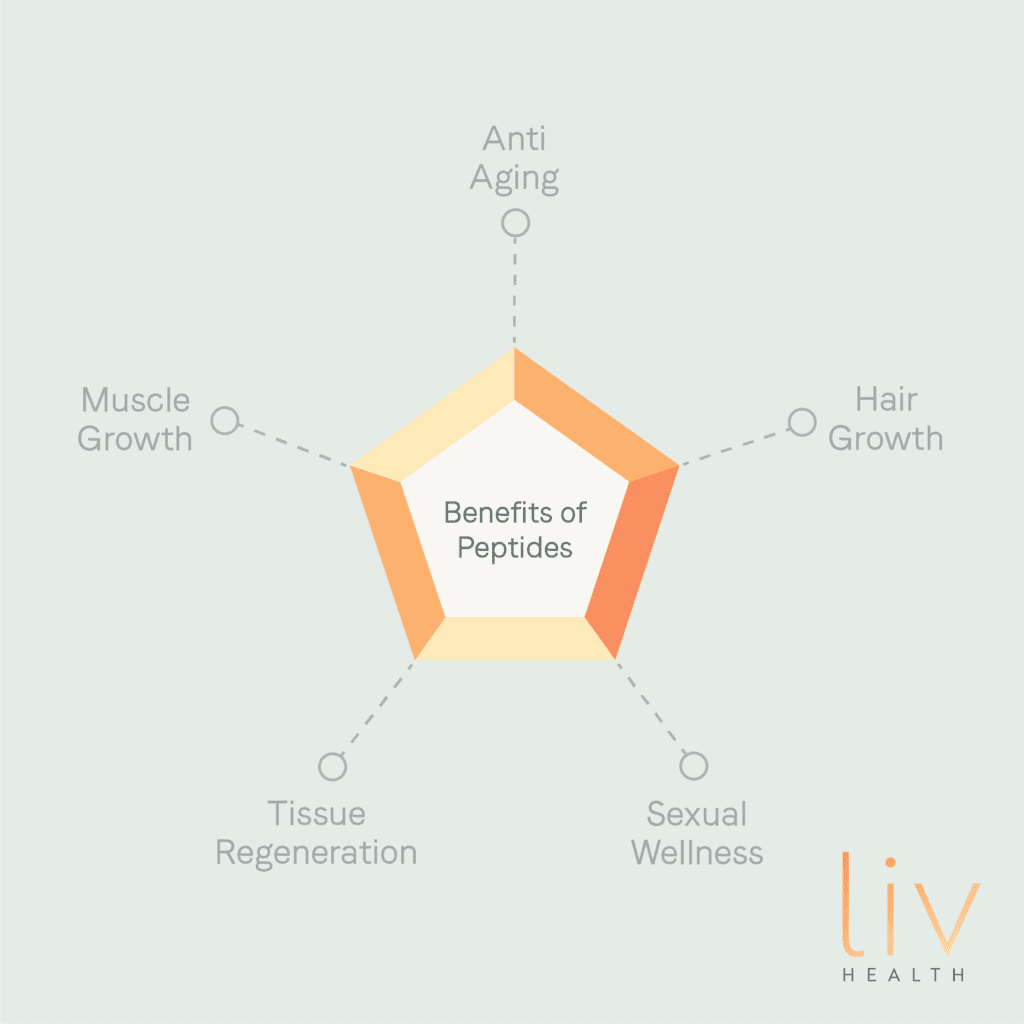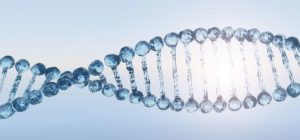What are peptides? Why are they popular in treatments? Find out below.
RELATED: HRT Hormone Replacement Therapy For Women: Frequently Asked Questions
In this article:
- What Are Peptides?
- What Are Peptides Used For?
- What Are Peptides for Bodybuilding?
- What Are Peptides for Skincare?
- What Are Peptides for Hair Loss?
- What Are the Peptides for Sexual Dysfunction?
- Which Peptides Help Fight Aging?
- Which Peptides Promote Tissue Healing?
- What Are the Side Effects of Using Peptides?
What Are Peptides? All Your Questions Answered
Click here to jump to the infographic.
What Are Peptides?
Peptides have been making their rounds in the communities of anti-aging and functional medicine for years. They are small chains of amino acids that make up proteins and are available in every part of your body.
Because peptides can be found in any part of the body, they have very specific functions. They act as messengers, signaling specific glands and proteins into performing specific tasks.
The growth hormone secretagogue, for example, is a peptide that helps with growth hormone production by stimulating the pituitary gland.
Peptide treatments are popular due to their small size and signaling capabilities, which induce natural bodily reactions.
What Are Peptides Used For?
The diminutive nature of peptides allows them to absorb and pass through the body easily and inflict no dangerous side effects. That’s why peptides are widely used in:
- Skincare products
- Anti-aging treatments
- Sports injury treatments
- Hair loss therapy
- Treatment of sexual dysfunction
- Biohacking
- Bodybuilding
What Are Peptides for Bodybuilding?
It was during the bodybuilding boom in the ’80s when peptides grew in popularity. Bodybuilders were looking for ways to gain more muscle and had discovered peptides as an alternative to anabolic steroids, which had severe side effects.
Secretagogue was among the first peptides used by bodybuilders, as well as Melanotan which is a tanning peptide. Through the years, the list of peptides for bodybuilding has increased to include the following:
- IGF-1 – Boosts insulin sensitivity for muscle growth
- MGF – Helps initiate hypertrophy and repair of damaged muscles
- GHRP – Stimulates the release of the human growth hormone (HGH)
- BPC-157 – Helps heal joints and muscles
- Follistatin – Helps increase fat loss and muscle growth
What Are Peptides for Skincare?
Certain peptides serve as messengers stimulating collagen and elastin production. They reduce the appearance of fine lines and wrinkles for plumper skin.
Here are some of the types of peptides used in skincare:
- Carrier peptides – Delivers minerals to the skin
- Enzyme Inhibitors – Slows down natural collagen breakdown
- Signal peptides – Delivers messages to the skin to help boost collagen, elastin, and protein production
- Neurotransmitter peptides – Also called the “Botox” peptide because they block chemicals that contract muscles to fight expression lines
Collagen is in high production until the age of 30, when we lose 1% of collagen produced each year. Using peptide creams or treatments on the skin then doesn’t immediately provide an instant collagen boost, but alerts your body to an emergency for collagen and hyaluronic acid.
What Are Peptides for Hair Loss?
Peptide therapy is a growing movement in the anti-hair loss industry. Peptides that specifically target hair loss actually target senescent cells, which are cells that no longer divide and refuse to die.
Examples of commonly used peptide for hair growth are:
- Copper peptides – GHK-Cu is a regenerative peptide for hair growth.
- Thymus peptides – These have been studied for chronic hair loss conditions such as telogen effluvium and androgenic alopecia.
RELATED: How To Arouse A Man With Low Testosterone
What Are the Peptides for Sexual Dysfunction?
A popular peptide in use for sexual dysfunction is PT 141. It is a melanocortin-based peptide that boosts libido by stimulating the release of dopamine.
Dopamine Definition: The hormone responsible for reward-motivation behavior
It is originally derived from Melanotan II, which stimulates skin pigmentation but also caused sexual arousal and erections in the majority of test subjects.
Which Peptides Help Fight Aging?
Epitalon is a peptide popular in anti-aging therapies. Being a small peptide composed of only 4 amino acids, it works by attaching itself to a DNA chain and dilates locally, increasing gene expression.
Gene Expression Definition: A process by which gene information is utilized to produce functional protein products. Simply put, it uses what’s already present in the body.
Another peptide used for anti-aging is FOXO4-DRI. It works by increasing gene expression via cell autophagy or the process of removing damaged cells.
Which Peptides Promote Tissue Healing?
Tissue healing peptides are especially useful for sports injuries as they allow them to heal faster.
Examples of peptides for healing tissues include:
- BPC-157 – An orally-administered peptide for healing torn ligaments
- TB-500 – An injectable peptide with an immediate repairing effect on injured tendons and ligaments
What Are the Side Effects of Using Peptides?
Peptides are a preferable treatment for several conditions due to their low incidence of serious side effects. They are unlike anabolic steroids which can cause raging moods or Viagra which can cause altered color perspective and hearing loss.
Side effects vary per person, peptide, and protocol. For a list of side effects, consult with your physician on a case-by-case basis.
The video below illustrates what peptides are. Check it out!
Peptides have a high potential in therapies and treatments for many conditions thanks to their small size and simple but extensive functions throughout the body. If you’re looking to jump into the peptide regimen, you can reach out to LIV Health.
Have you tried peptide therapy before? Do you want to try it out for yourself? Share your thoughts and experiences with us in the comments section below!
Up Next:
- Everything You Should Know About Vaginal Dryness During Sex
- Perimenopause | Premenopause Symptoms | What Are The First Signs Of Menopause?
- Is Your Vagina Depressed? Symptoms Of Vulvodynia And How To Treat It



